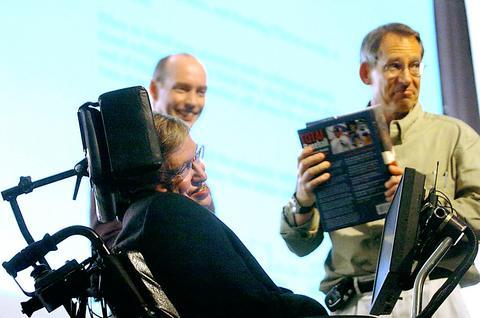"I want to report that I think I have solved a major problem in theoretical physics." With those words the eminent physicist Stephen Hawking opened a lecture at a scientific conference in Dublin on Wednesday which, in true Hawking style, overturned decades of scientific thinking, thrilled many of his academic peers and left everyone else scratching their heads.
Speaking to an audience of more than 600 physicists and dozens of the world's media, Hawking said he now believed that black holes, the mysterious massive vortexes formed from collapsed stars, do not destroy everything that is sucked into them. Instead, an abstract quantity called "information," which de-scribes the core characteristics of every type of particle, leaks from the black hole over time.
The announcement marks a U-turn from Hawking, who had argued that anything swallowed by a black hole was forever hidden from the outside universe. It has also lost him one of the most famous bets in science: in 1997 Hawking and physicist Kip Thorne made a wager with John Preskill at the California Institute of Technology, who insisted that information carried by an object entering a black hole was not destroyed.

PHOTO: EPA
"I'm now ready to concede the bet," Hawking said. An encyclopedia was to be chosen by the winner.
"John is all-American, so naturally he wants an encyclopedia of baseball. I had great difficulty finding one over here, so I offered him an encyclopedia of cricket as an alternative," Hawking said. "But John wouldn't be persuaded of the superiority of cricket."
The about-turn ends a 30-year personal struggle for Hawking. In 1974, while formulating new equations in an attempt to unite the heavyweight ideas of quantum mechanics and general relativity, he realized that black holes must emit heat, now known as Hawking radiation. The problem was that this radiation would carry energy away, meaning the black hole would gradually evaporate and then disappear in a final explosive outburst -- taking the crucial information with it. This contradicts the fundamental laws of quantum physics, which insist the information can never be fully wiped out.
While several physicists over the years offered solutions to this paradox, Hawking believed that the intense gravity inside a black hole somehow unravelled the quantum laws. More intriguingly, he suggested that the vanishing information might travel through the black hole to a parallel universe -- planting the seeds for a staple of science fiction.
"There is no baby universe branching off as I once thought," Hawking admitted. "I'm sorry to disappoint science fiction fans but if information is preserved there is no possibility of using black holes to travel to other universes. If you jump into a black hole, your mass energy will be returned to our universe, but in a mangled form which contains the information about what you were like."
His calculations suggest the surface of the black hole, the event horizon, has fluctuations that let the information escape.
"It is great to solve a problem that has been troubling me for nearly 30 years, even though the answer is less exciting than the alternative I suggested," he said.

VAGUE: The criteria of the amnesty remain unclear, but it would cover political violence from 1999 to today, and those convicted of murder or drug trafficking would not qualify Venezuelan Acting President Delcy Rodriguez on Friday announced an amnesty bill that could lead to the release of hundreds of prisoners, including opposition leaders, journalists and human rights activists detained for political reasons. The measure had long been sought by the US-backed opposition. It is the latest concession Rodriguez has made since taking the reins of the country on Jan. 3 after the brazen seizure of then-Venezuelan president Nicolas Maduro. Rodriguez told a gathering of justices, magistrates, ministers, military brass and other government leaders that the ruling party-controlled Venezuelan National Assembly would take up the bill with urgency. Rodriguez also announced the shutdown

Civil society leaders and members of a left-wing coalition yesterday filed impeachment complaints against Philippine Vice President Sara Duterte, restarting a process sidelined by the Supreme Court last year. Both cases accuse Duterte of misusing public funds during her term as education secretary, while one revives allegations that she threatened to assassinate former ally Philippine President Ferdinand Marcos Jr. The filings come on the same day that a committee in the House of Representatives was to begin hearings into impeachment complaints against Marcos, accused of corruption tied to a spiraling scandal over bogus flood control projects. Under the constitution, an impeachment by the

Exiled Tibetans began a unique global election yesterday for a government representing a homeland many have never seen, as part of a democratic exercise voters say carries great weight. From red-robed Buddhist monks in the snowy Himalayas, to political exiles in megacities across South Asia, to refugees in Australia, Europe and North America, voting takes place in 27 countries — but not China. “Elections ... show that the struggle for Tibet’s freedom and independence continues from generation to generation,” said candidate Gyaltsen Chokye, 33, who is based in the Indian hill-town of Dharamsala, headquarters of the government-in-exile, the Central Tibetan Administration (CTA). It

A Virginia man having an affair with the family’s Brazilian au pair on Monday was found guilty of murdering his wife and another man that prosecutors say was lured to the house as a fall guy. Brendan Banfield, a former Internal Revenue Service law enforcement officer, told police he came across Joseph Ryan attacking his wife, Christine Banfield, with a knife on the morning of Feb. 24, 2023. He shot Ryan and then Juliana Magalhaes, the au pair, shot him, too, but officials argued in court that the story was too good to be true, telling jurors that Brendan Banfield set